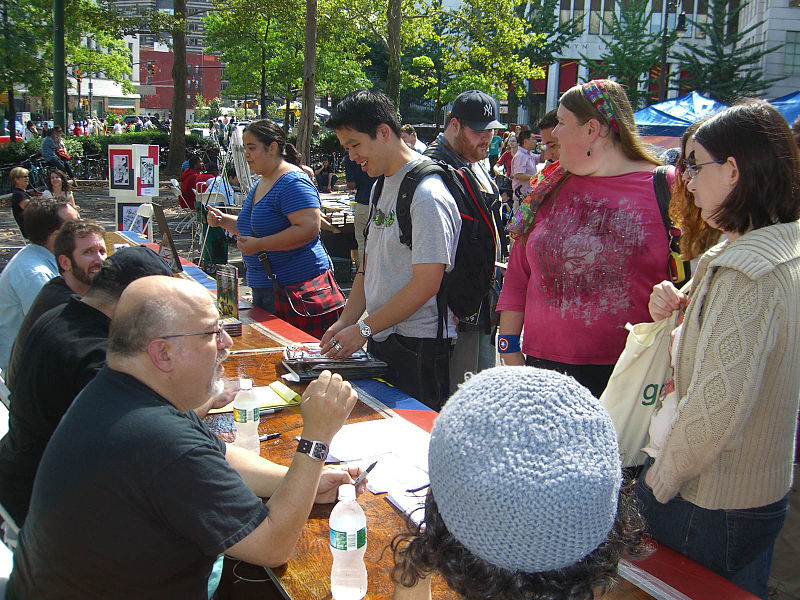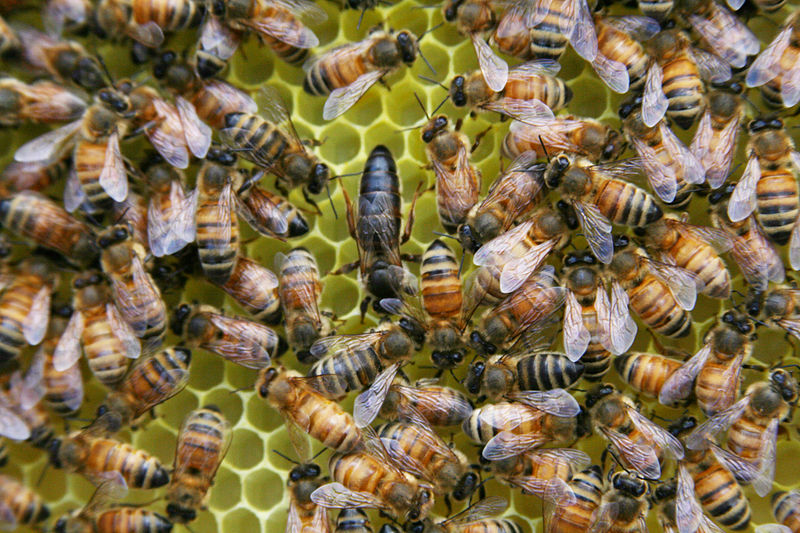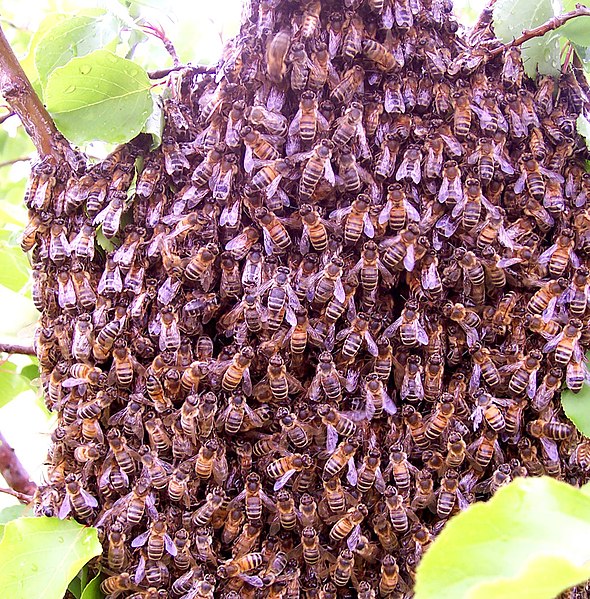Today I'm exhibiting for the first time at the Brooklyn Book Festival, booth 137, at the northern end of the Borough Hall exhibition space in Brooklyn. The festival is held at Borough Hall rain or shine, but at this point it looks like shine. My young friend Silas and I will be there under the sign BROWDERBOOKS. If anyone is in the neighborhood, come say hello, and no, you don't have to buy a book, though I won't refuse if you insist. Book fairs are fun. Just wander about and enjoy.
 |
| Brooklyn Book Festival, 2009. Nightscream |
I’ve always had a thing about bees. Specifically, about Apis mellifera, the honey bee.
Not that I’ve ever kept them, far from it. But as a vegan shunning animal-based foods, I
always made an exception for honey, because I thought the way bees made it was
a culinary and biological wonder. The
parting advice to me from the dean of my college was to keep bees. I was graduating with a major in English with
emphasis on writing, and my near-term plans were vague. So he told me of a writer who explained that
she kept bees. “In the summer I keep the
bees, and in the winter they keep me.”
Profits from the honey she sold were enough to heat her house, or at
least part of it; her bedroom was cold, but the rest of the place was heated. And that’s how she got by as a writer.
 |
| Bees on a honeycomb. Waugsberg |
Later I managed to read Virgil’s Georgics in Latin, the fourth book of which includes a treatise on
beekeeping. And then I read
Maeterlinck’s The Life of the Bee, albeit
in English, and marveled at the drama and grace that this literary master put
into the subject. Imagine: the endless
toil of the queen, on whom the survival of the whole hive depends. And the drama of her mating, when she climbs
higher, higher, higher in the air, followed by the drones, who one by one fall
away, till only one is left, the strongest, with whom she mates in midair and then
tears out his guts, following which his ravaged body falls lifeless to the
ground. What a wedding! It’s rather as if Tarzan and Jane had mated,
and Jane then tears out his innards, goes about her business, and in time gives
birth to a host of Tarzan Jr's. And following the
queen’s fantastic mating comes yet another bit of drama: the massacre of the
drones. Because who needs these useless
males, now that the queen is again impregnated, and destined to go on with her
relentless toil? In this world, it’s the
girls who work, fetching pollen and making honey. The males are tolerated only because they are
– occasionally – necessary for mating.
(If I’ve got any of these details wrong, may the purists forgive
me. It’s been a long time since I read
Maeterlinck.)
 |
| A queen bee in the hive. Which one is she? The dark one in the center, of course, surrounded by tiger-striped worker bees. And not a male in sight. Levi Asay |
Urban life put a distance between me and the honey bee, but
I got back to her through hiking, since my hikes were really long-distance
nature walks, with time for flowers and the insects crawling over or flitting
around them. I loved to see honey bees
buzzing about the blossoms, sticking their tubelike tongue, or proboscis, deep
into flowers to suck nectar, while the little baskets on their hind legs got
caked with pollen.
 |
| Louise Docker |
As their tongue darted
needlelike into flower after flower, they had no time to worry about me
watching them up close, so I usually got a good look. Sometimes, while feeding on my favorite
summer flower, the milkweed, they got trapped in that treacherous flower’s
sticky pollen, and squirmed and wiggled there, unable to get free, a tempting
morsel for a hungry spider or yellow jacket.
Knowing such to be their likely fate, I would always take a twig and gently
free them so they could go on their merry pollen-seeking way.
 |
| Luc Viatour |
Beekeeping used to be taboo in New York, thanks to the
all-knowing and protective care of the city authorities, who apparently considered
bees as dangerous as wasps and rattlesnakes.
But in the long run sanity has a way of prevailing, and in 2010 the ban was
lifted, and New Yorkers were soon quite legally installing hives in gardens and
on rooftops and balconies. But the
welcome mat was rolled out only for honey bees; wasps and hornets are still verboten.
A sign of the new tolerance of honey bees is the Andrew’s
Honey stand in the Union Square Greenmarket, which advertises locally harvested
honey, some of it from rooftops right close by.
Andrew’s website says that his family, now based in Norwalk, Connecticut,
have been keeping bees since the 1800s, and now have hives also in four of the
five boroughs. (I’ll bet that the
missing borough is Staten Island, which always gets left out.) They sell Union Square honey, Upper East Side
honey, East Village honey, Central Park honey, Brooklyn honey, Queens honey, and
even honey from “Da Bronx.” And services
they offer include bee doctor consultations, swarm removals, and urban honey
tours. Obviously, Andrew wants to be
known as the go-to guy for honey. If his
honey is sampled by me rarely, it’s because my sweet tooth is very limited, and
even the best honey is sticky.
The problems facing bees and their keepers today are well
known and, if one likes bees and honey, scary.
Bees are dying in large numbers all over the world because of a host of
causes:
· climate change, causing wildfires and hurricanes and
flooding
· our heavy use of insecticides
· the Varroa mite, which sucks the bees’ blood and
leaves them unable to navigate
· suburban sprawl, depriving them of habitat
· drought
· theft.
Theft? Yes, theft. Two men were arrested in California in 2017
for participating in an operation stealing hives worth up to a million dollars –
the largest bee heist ever. And these
losses affect us all, for one third of the foods we eat depend on bee pollination; without bees, our diet would be drastically reduced.
 |
| Bees swarming. fir0002 |
One countertrend is the growth of urban beekeeping, and
nowhere is this more noticeable than in New York. But it can pose problems. On the afternoon of Tuesday, August 28,
thousands of honey bees suddenly swarmed over Times Square, sending tourists
and passersby scrambling. After a few
minutes the swarm settled on the cart of a dismayed hot dog vendor at 43rd
Street and Broadway, their dense mass weighing down sections of the stand’s
umbrella. Onlookers flocked to watch at
a safe remove, and among them by chance was beekeeper Andrew, who estimated the
swarm at 15,000 to 20,000 bees, and said that there were at least a dozen rooftop
hives within a block of there. To the
rescue came New York’s Finest in the form of an officer of the Police
Department’s beekeeper unit – yes, there is such a unit – who, keeping his face
veiled with a net, used a large vacuum cleaner to suck up the swarm and remove
it safely to a new location. Swarms
usually occur in the spring, but Andrew opined that the summer heat may have
prompted a queen to abandon her hive and take thousands of her worker bees with
her in search of a new location. Which
makes sense, unless they just wanted a hot dog.
It was all over in an hour, allowing Times Square to return to its usual
quiet commotion, after a rare event that tourists who witnessed and
photographed it will not soon forget.
Coming soon: Maybe Madison Square, maybe the Brooklyn Book Festival.
BROWDERBOOKS
All books are available online as indicated, or from the author.
1. No Place for Normal: New York / Stories from the Most Exciting City in the World (Mill City Press, 2015). Winner of the Tenth Annual National Indie Excellence Award for Regional Non-Fiction; first place in the Travel category of the 2015-2016 Reader Views Literary Awards; and Honorable Mention in the Culture category of the Eric Hoffer Book Awards for 2016. All about anything and everything New York: alcoholics, abortionists, greenmarkets, Occupy Wall Street, the Gay Pride Parade, my mugging in Central Park, peyote visions, and an artist who made art of a blackened human toe.
If you love the city (or hate it), this may be the book for you. An award winner, it sold well at BookCon 2017 and 2018.
 |
Reviews
"If you want wonderful inside tales about New York, this is the book for you. Cliff Browder has a way with his writing that makes the city I lived in for 40 plus years come alive in a new and delightful way. A refreshing view on NYC that will not disappoint." Five-star Amazon customer review by Bill L.
"To read No Place for Normal: New York is to enter into Cliff Browder’s rich and engaging sixty years of adult life in New York. Yes, he delves back before his time – from the city’s origins to the 19th Century that Ms. Trollope and Mr. Dickens encounter to robber barons and slums that marked highs and lows of the earlier Twentieth Century. But Browder has lived such an engaged and curious life that he can’t help but cross paths with every layer and period of society. There is something Whitmanesque in his outlook." Five-star Amazon customer review by Michael P. Hartnett.
Available from Amazon and Barnes & Noble.
2. Bill Hope: His Story (Anaphora Literary Press, 2017), the second novel in the Metropolis series. New York City, 1870s: From his cell in the gloomy prison known as the Tombs, young Bill Hope spills out in a torrent of words the story of his career as a pickpocket and shoplifter; his brutal treatment at Sing Sing and escape from another prison in a coffin; his forays into brownstones and polite society; and his sojourn among the “loonies” in a madhouse, from which he emerges to face betrayal and death threats, and possible involvement in a murder. Driving him throughout is a fierce desire for better, a persistent and undying hope.
Reviews
"A real yarn of a story about a lovable pickpocket who gets into trouble and has a great adventure. A must read." Five-star Amazon customer review by nicole w brown.
"This was a fun book. The main character seemed like a cross between Huck Finn and a Charles Dickens character. I would recommend this." Four-star LibraryThing review by stephvin.
Available from Amazon and Barnes & Noble.
3. Dark Knowledge (Anaphora Literary Press, 2018), the third novel in the Metropolis series. Adult and young adult. A fast-moving historical novel about New York City and the slave trade, with the sights and sounds and smells of the waterfront.

New York City, late 1860s. When young Chris Harmony learns that members of his family may have been involved in the illegal pre-Civil War slave trade, he is appalled. Determined to learn the truth, he begins an investigation that takes him into a dingy waterfront saloon, musty old maritime records that yield startling secrets, and elegant brownstone parlors that may have been furnished by the trade. Since those once involved dread exposure, he meets denials and evasions, then threats, and a key witness is murdered. What price must Chris pay to learn the painful truth and proclaim it?
Reviews
"A lively and entertaining tale. The writing styles, plot, pace and character development were excellent." Four-star LibraryThing early review by BridgitDavis.
"A lively and entertaining tale. The writing styles, plot, pace and character development were excellent." Four-star LibraryThing early review by BridgitDavis.
"At first the plot ... seemed a bit contrived, but I was soon swept up in the tale." Four-star LibraryThing early review by snash.
"I am glad that I have read this book as it goes into great detail and the presentation is amazing. The Author obviously knows his stuff." Four-star LibraryThing early review by Moiser20.
4. The Pleasuring of Men (Gival Press, 2011), the first novel in the Metropolis series, tells the story of a respectably raised young man who chooses to become a male prostitute in late 1860s New York and falls in love with his most difficult client.
What was the gay scene like in nineteenth-century New York? Gay romance, but women have read it and reviewed it. (The cover illustration doesn't hurt.)
What was the gay scene like in nineteenth-century New York? Gay romance, but women have read it and reviewed it. (The cover illustration doesn't hurt.)
 |
Reviews
"At times amusing, gritty, heartfelt and a little sexy -- this would make a great summer read." Four-star Amazon customer review by BobW.
"Really more of a fantasy of a 19th century gay life than any kind of historical representation of the same." Three-star Goodreads review by Rachel.
"The detail Browder brings to this glimpse into history is only equaled by his writing of credible and interesting characters. Highly recommended." Five-star Goodreads review by Nan Hawthorne.
Available from Amazon and Barnes & Noble.
5. Fascinating New Yorkers: Power Freaks, Mobsters, liberated Women, Creators, Queers and Crazies (Black Rose Writing, 2018). A collection of posts from this blog. Short biographical sketches of people, some remembered and some forgotten, who lived or died in New York. All kinds of wild stuff, plus some stuff that isn't quite wild but fascinating. New York is a mecca for hustlers of every kind, some likable and some horrible, but they are never boring.

Reviews
"Fascinating New Yorkers by Clifford Browder was like sitting down with a dear friend and catching up on the latest gossip and stories. Written with a flair to keep the reader turning the pages, I couldn't stop reading it and thinking about the subjects of each New Yorker. I love NYC and this book just added to the list of reasons why, a must read for those who love NYC and the people who have lived there." Five-star NetGalley review by Patty Ramirez, librarian.
"Unputdownable." Five-star review by Dipali Sen, retired librarian.
"I felt like I was gossiping with a friend when reading this, as the author wrote about New Yorkers who are unique in one way or another. I am hoping for another book featuring more New Yorkers, as I couldn't put this down and read it in one sitting!" Five-star NetGalley review by Cristie Underwood.
© 2018 Clifford Browder

No comments:
Post a Comment